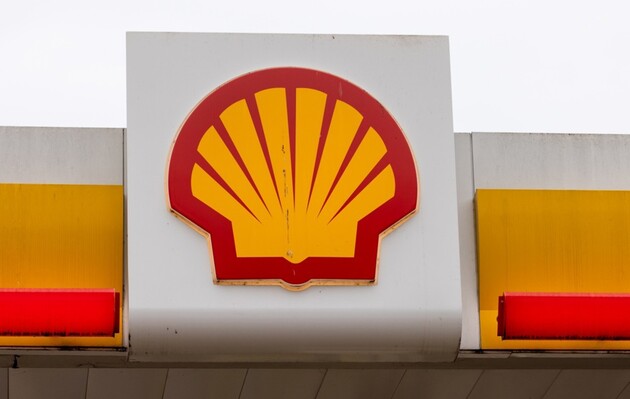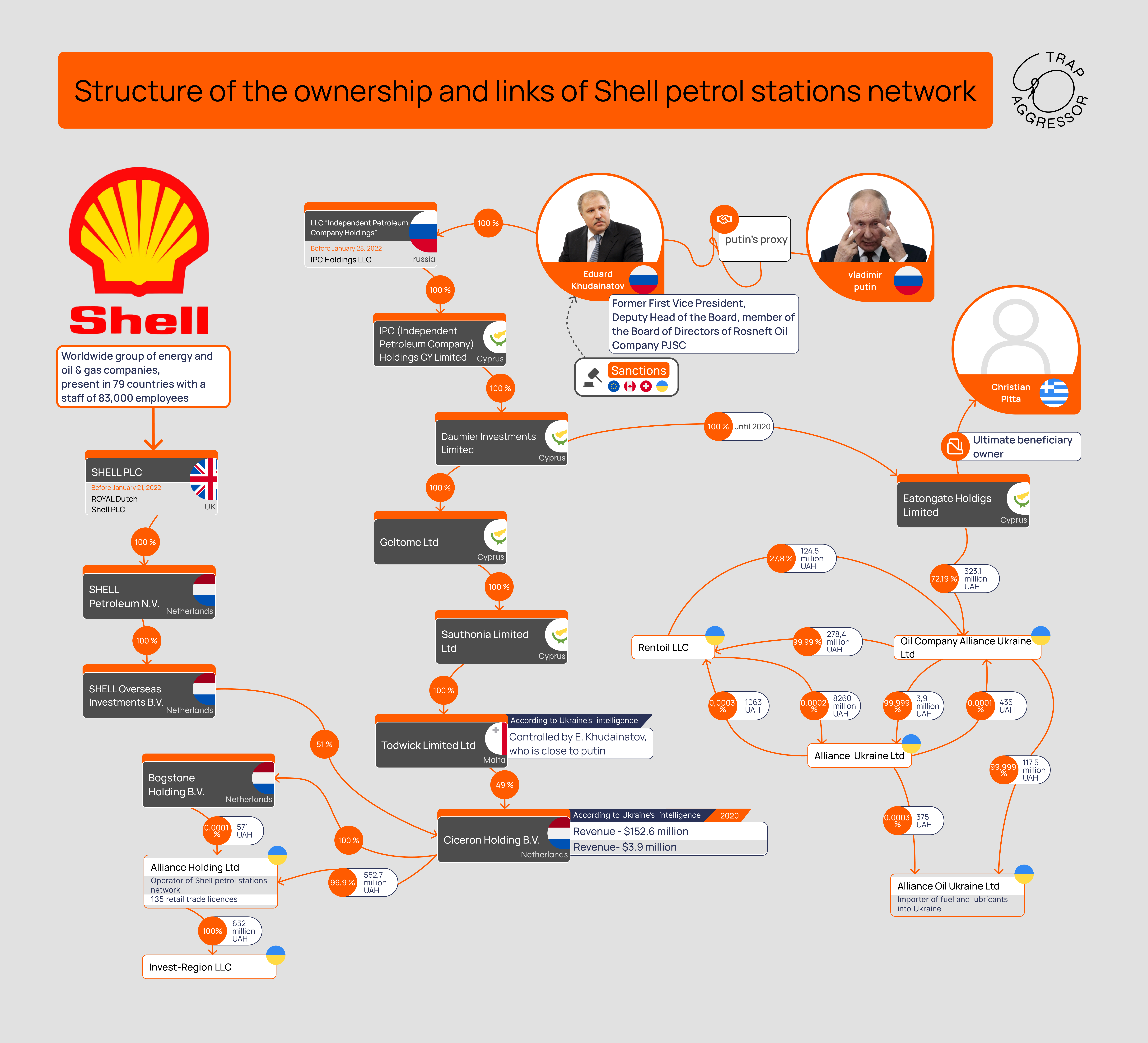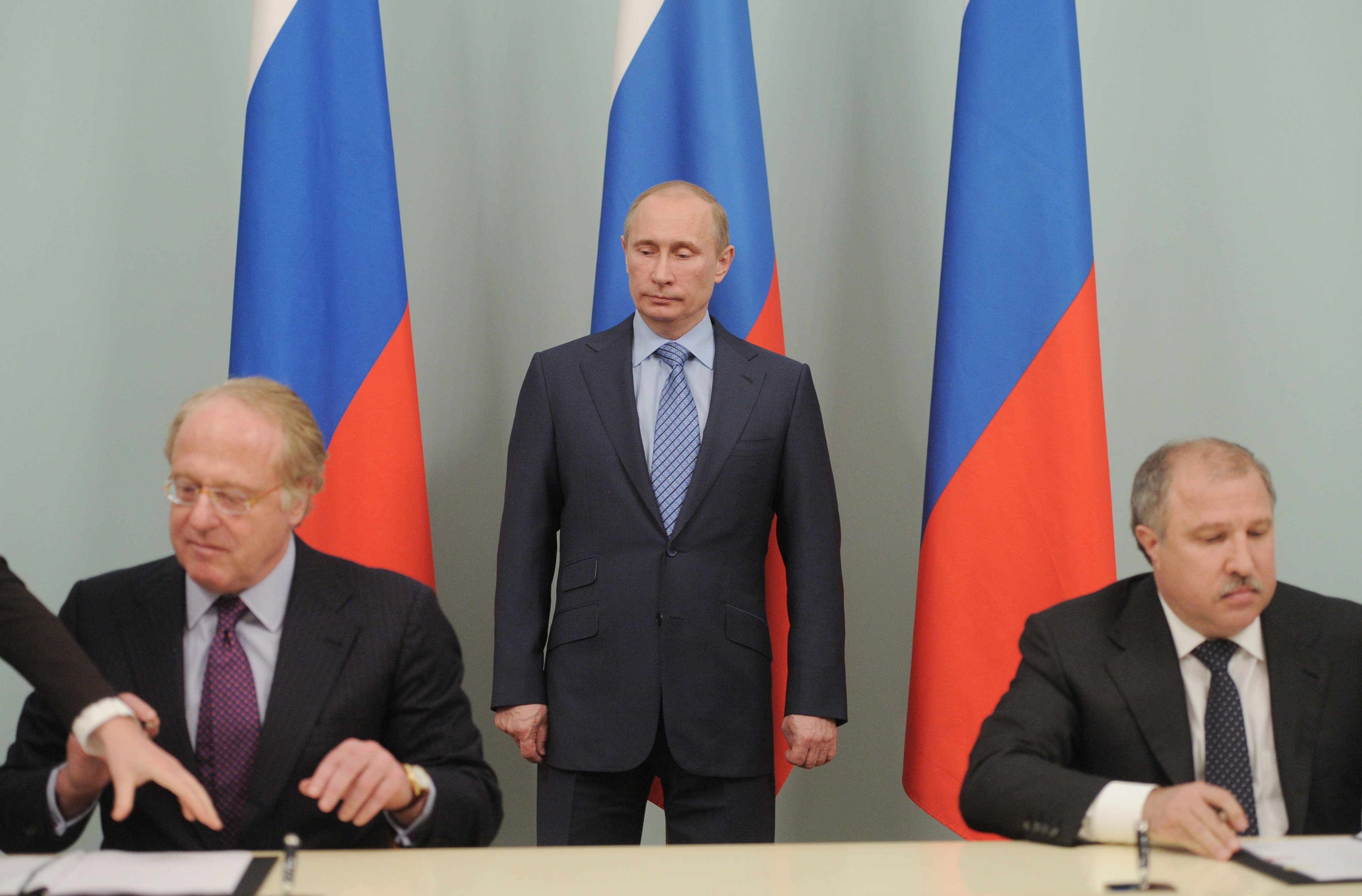Whom Shell Really Helps — Putin’s Oligarch or Ukraine?

After the full-scale invasion broke out, dozens of international companies announced their withdrawal from Russian markets and their intention to support Ukraine. Some even announced the allocation of funds to aid our state. However, some international heavyweights decided to straddle two worlds. For example, the oil and gas giant Royal Dutch Shell has not ceased its cooperation with the Russian Federation since the beginning of the full-scale war, although it announced the creation of a fund in support of Ukraine. The reason is quite prosaic: war is war, but Shell structures had at least three major projects with the Russians: shares in Sakhalin-2 and Salim Petroleum, in addition to participation in the Caspian Pipeline Consortium.
Well, yes, Shell has announced its withdrawal from the Sakhalin-2 project, and it seems to have withdrawn from Salim Petroleum, but on its own terms, as it were. We will remind you that until December 22, 2022, the above-mentioned transnational giant and the company Gazprom Neft were the shareholders of Salim Petroleum on parity with the Russians. Few people know that Shell's exit from this partnership was accompanied by a rather covert process in Ukraine and the Netherlands, which was related to the joint company Alliance Holding. In this enterprise, 51%, through a company from the Netherlands, belonged to Royal Dutch Shell, whereas the other 49% were owned by Putin’s oligarch Eduard Khudainatov.
We will remind you that the latter owned a number of assets both in Russia and Ukraine. Khudainatov is no ordinary Russian billionaire: he is deeply integrated into the closest circle of Putin's entourage as a former member of the board of directors of Rosneft and is considered one of dozens of “purses” of the head of the Kremlin due to his connection with Igor Sechin. The latter has accompanied Vladimir Putin throughout his career, since the time when the current president of the Russian Federation worked in the St. Petersburg City Hall.
On January 26, 2024, the High Anti-Corruption Court issued a decision on the seizure of Eduard Khudainatov’s assets located on the territory of our country based on the lawsuit of the Ministry of Justice of Ukraine. At that time, 100% of his shares in the authorized capital of Alliance-Ukraine Oil Company Ltd were charged. It seems like a win. But not quite so, because the High Anti-Corruption Court refused another demand of the Ministry of Justice as to the recovery of the aforementioned 49% share in the authorized capital of Alliance Holding. The reason for the refusal was a whole series of actions taken by Royal Dutch Shell with the aim of diluting Khudainatov's share in the offshore company Cicerone Holding B.V., which in turn owns Alliance Holding Oil Company Ltd. The international conglomerate planned it and acted accordingly.
In legal terms, it looked as follows. At the beginning of the full-scale war, through the offshore company Todwick Ltd (Malta), Eduard Khudainatov actually owned 49% of Alliance Holding Ltd. In turn, Royal Dutch Shell controlled through Shell Overseas Investments B.V. 51% of shares in the said Ukrainian legal entity. I would like to remind you that the Cabinet of Ministers of Ukraine by resolution No. 187 of March 3, 2022 “On ensuring the protection of national interests in future lawsuits of the state of Ukraine in connection with the military aggression of the Russian Federation” established a public moratorium on the alienation (redistribution, etc.) of corporate rights of legal entities in Ukraine, where the ultimate beneficiary are the subjects of the Russian Federation. Of course, this moratorium became applicable to Khudainatov. Deeds (including powers of attorney) entered into in violation of this moratorium, including if they provide for appropriate alienation in the future, are null and void. Subsequently, “Putin's purse” Khudainatov came under sanctions both from the Ukrainian side and from the European Union.
However, contrary to this public moratorium, the Royal Dutch Shell company applied to the Chamber of Entrepreneurship of the Court of Appeal of the City of Amsterdam for the purpose of an additional release (issue) of shares in the Cicerone Holding B.V. company. No one stood in her way.
The issue actually diluted the share of Eduard Khudainatov, gradually reducing his participation from 49 to 2.56%. The oil and gas giant could not be unaware of the public moratorium. The corresponding actions contradict both international legislation and legal norms in Ukraine and the Netherlands. The abovementioned issue of shares led to a reduction in the scope of rights to manage the share portfolio of Cicerone Holding B.V. Khudainatov. As a result, it deprived Ukraine of the right to compensation for damages caused by the armed aggression at the expense of the assets of a person who, through his companies, facilitated the full-scale invasion.
Of course, there is a version of the company that justifies the appeal of Shell Overseas B.V. to the Business Chamber of the Amsterdam Court of Appeal with the need to financially rescue the company Cicerone Holding B.V. The latter needed financial infusions after a full-scale invasion to continue functioning.
The funds were provided precisely as financial aid (repayable and non-repayable) to a Ukrainian legal entity, although they were supposed to be included in the authorized capital. However, as of May 2022, Shell Overseas Investments B.V. puts forward a demand — further support of Ukrainian business is possible only if the share of corporate rights is increased and that it requires an additional issuance of shares of the specified company. Shell Overseas Investments B.V. substantiated its position, among other things, by the refusal of Todwick Holdings LTD, which is controlled by Khudainatov, to provide the initiated financial support.
In fact, there was another option. Shell Overseas Investments B.V. could theoretically buy a share in Cicerone Holding B.V. from Todwick Holdings Ltd., a company controlled by Khudainatov. But there is one caveat. At that time, on June 3, 2022, the European Union had already imposed sanctions on “Putin's purse.” That's why Shell lawyers hurried to the Chamber of Entrepreneurship of the Court of Appeal of the city of Amsterdam and gradually diluted Khudainatov's share in Cicerone in total disregard of sanctions or the public moratorium established by Ukraine. The international giant Shell desperately needed to throw out a toxic shareholder from the joint venture. And that’s not to mention the organized "assessment" of the value of the assets of Alliance Holding LLC in the amount of $700,000. It's not even funny anymore, because if you divide this amount by the number of gas stations in Ukraine, it turns out that the cost of one gas station is equal to a third of the renting it. So we won't even draw your attention to the conclusions of the KPMG audit — it's just a shame how the international giant Royal Dutch Shell technically organized its machination.
Meanwhile, as of July 2023, Royal Dutch Shell continues to trade Russian gas after promising to withdraw from the Russian energy market. Although after the full-scale invasion of Ukraine, Shell announced its exit from the Russian market and a write-off of up to $5 billion in assets and investments in Russia. It was about 27.5% of the shares in the Sakhalin-2 project, which concerns a large oil field and offshore gas drilling in Russia’s Far East. Here we also see the principle “there is one but”: later on, Royal Dutch Shell signed an agreement with the Russians, namely with the Novatek company (controlled by another friend of Putin, Gennadiy Timchenko and oligarch Leonid Mikhelson), on the sale of its shares for 95 billion rubles, which amounted to a little more than a billion dollars at that date.
War is war, and money is money. So it can be assumed that the dilution of Eduard Khudainatov's shares in the Cicerone company was part of the agreement on the sale (and not the free nationalization) of shares in the same Sakhalin-2 project to Putin's entourage. Hopefully, the judges in the Appeals Chamber of the Ukrainian Chamber of Commerce and Industry will understand the global game and the attempt to “legally” remove Putin's oligarchs from the firing line after the imposition of EU sanctions and will, accordingly, make a decision to collect the full share of Khudainatov in Alliance Holding LLC, i.e. 49%, and not 2.56%, in favor of the state.
To maintain a balance of opinions, the editors add the position of Shell plc in Ukraine:
Since the start of Russia's full-scale invasion of Ukraine in February 2022, Shell has been committed to supporting critical national infrastructure in the country and allocated millions of dollars to keep its Ukrainian retail business going. At present, 90% (or 118) of its gas stations under the Shell brand continue to operate in Ukraine.
Shell no longer conducts any business activities in Russia and is transparent in its actions before the state authorities of Ukraine. Unfortunately, though, Shell is heading back to court this week to defend its assets against a renewed attempt by the Ministry of Justice to expropriate 49% of its Ukrainian business.
Shell manages its retail business in Ukraine through a joint holding company registered in the Netherlands. Shell currently owns 97.44% of the company's shares. According to Dutch law and based on Dutch court rulings, the number of shares owned by Shell increased thanks to Shell infusing cash into the Ukrainian business, something the other partner in the holding has not done. Such actions were necessary to ensure the continued functioning of the business.
These facts were rightly recognized by the High Anti-Corruption Court on January 26, 2024. Back then, it ruled in favor of Shell, confirming that the Ministry of Justice’s attempt to nationalize 49% of our business was based on incorrect and outdated information.
In the long term, the lawsuit regarding the expropriation of Shell's assets demonstrates disregard for the jurisdiction of the courts of one of the founding countries of the European Union, which Ukraine aspires to become a member of. These actions are directed against Shell and our efforts to keep critical national infrastructure running. In addition, they can have a negative impact on the interest of potential new investors in the reconstruction of Ukraine.
Read this article in Ukrainian and russian.
Please select it with the mouse and press Ctrl+Enter or Submit a bug













 Login with Google
Login with Google